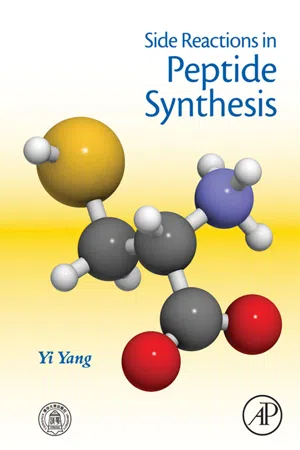
Side Reactions in Peptide Synthesis
Yi Yang
- 376 pages
- English
- ePUB (mobile friendly)
- Available on iOS & Android
Side Reactions in Peptide Synthesis
Yi Yang
About This Book
Side Reactions in Peptide Synthesis, based on the author's academic and industrial experience, and backed by a thorough review of the current literature, provides analysis of, and proposes solutions to, the most frequently encountered side reactions during peptide and peptidomimetic synthesis.
This valuable handbook is ideal for research and process chemists working with peptide synthesis in diverse settings across academic, biotech, and pharmaceutical research and development.
While peptide chemistry is increasingly prevalent, common side reactions and their causes are often poorly understood or anticipated, causing unnecessary waste of materials and delay.
Each chapter discusses common side reactions through detailed chemical equations, proposed mechanisms (if any), theoretical background, and finally, a variety of possible solutions to avoid or alleviate the specified side reaction.
- Provides a systematic examination on how to troubleshoot and minimize the most frequent side reactions in peptide synthesis
- Gives chemists the background information and the practical tools they need to successfully troubleshoot and improve results
- Includes optimization-oriented analysis of side reactions in peptide synthesis for improved industrial process development in peptidyl API (active pharmaceutical ingredient) production
- Answers the growing, global need for improved, replicable processes to avoid impurities and maintain the integrity of the end product.
- Presents a thorough discussion of critical factors in peptide synthesis which are often neglected or underestimated by chemists
- Covers solid phase and solution phase methodologies, and provides abundant references for further exploration
Frequently asked questions
Information
Peptide Fragmentation/Deletion Side Reactions
Abstract
Keywords
1.1. Acidolysis of peptides containing N-Ac-N-alkyl-Xaa motif
Table of contents
- Cover
- Title page
- Table of Contents
- Copyright
- Dedication
- Preface
- Chapter 1: Peptide Fragmentation/Deletion Side Reactions
- Chapter 2: β-Elimination Side Reactions
- Chapter 3: Peptide Global Deprotection/Scavenger-Induced Side Reactions
- Chapter 4: Peptide Rearrangement Side Reactions
- Chapter 5: Side Reactions Upon Amino Acid/Peptide Carboxyl Activation
- Chapter 6: Intramolecular Cyclization Side Reactions
- Chapter 7: Side Reactions on Amino Groups in Peptide Synthesis
- Chapter 8: Side Reactions on Hydroxyl and Carboxyl Groups in Peptide Synthesis
- Chapter 9: Peptide Oxidation/Reduction Side Reactions
- Chapter 10: Redundant Amino Acid Coupling Side Reactions
- Chapter 11: Peptide Racemization
- Chapter 12: Side Reactions in Peptide Phosphorylation
- Chapter 13: Cys Disulfide-Related Side Reactions in Peptide Synthesis
- Chapter 14: Solvent-Induced Side Reactions in Peptide Synthesis
- Appendix I: Molecular Weight Deviation of Peptide Impurity
- Appendix II: List of Abbreviations
- Subject Index